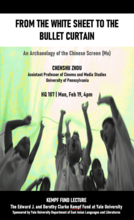Event time:
Monday, February 19, 2024 - 4:00pm
Location:
Humanities Quadrangle (HQ), 107
320 York St
New Haven, CT
06511
Event description:
From the White Sheet to the Bullet Curtain: An Archaeology of the Chinese Screen (Mu)
This talk will focus on the Chinese notion of mu, which can refer to screens of various kinds (as in yinmu, the silver screen, and pingmu, the cathode-ray tube screen or digital screen) while retaining its original meaning of “curtain” in usages such as zimu (“word-curtain,” i.e. subtitles) and danmu (“bullet-curtain,” which refers to flying comments that appear directly on top of videos on popular video-streaming sites in China). By centering on mu in its indigenous and translocal contexts, I aim to develop an alternative screenology by moving away from the Euro-American contexts in which most media archaeologies of the screen have been attempted. As mu confuses the boundaries between screens and other fabric materials that are soft, pliable, and layerable, it offers a critical linkage for examining the developments of cinema and new digital media in the Chinese-speaking world. Through an archaeological approach, I hope to explain, among other things, why the function of danmu, having originated in Japan, became so popular in China and yet was rarely adopted into wide usage elsewhere. Methodologically, I aim to further explore the implications of doing media archaeology cross-culturally. In addition to the past and the present, which make up the typical coordinates of media archaeology, I ask what happens when these temporal coordinates are mapped onto geographical ones.
Chenshu Zhou (she/her) is Assistant Professor of Cinema and Media Studies at the University of Pennsylvania. She received her PhD from Stanford University. Her current research centers on media experiences in modern and contemporary China. She is the author of Cinema Off Screen: Moviegoing in Socialist China (University of California Press, 2021), which received the 2022 Best First Book Award from the Society of Cinema and Media Studies. Her current book project investigates the relationship between media consumption and temporality against China’s transition from socialism to neoliberal authoritarianism.
